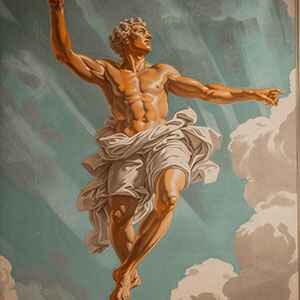Iapetus
In Greek mythology, Iapetus is one of the Titans, a race of powerful and primordial deities that predate the Olympian gods. Iapetus is associated with mortality and human life. Here are key aspects of Iapetus in Greek mythology:
Parentage: Uranus & Gaea
Siblings: Cronus, Oceanus, Hyperion, Coeus, among others
Consort: Clymene
Offspring: Atlas, Prometheus, Epimetheus, Menoetius

1. Parentage and Generation: Iapetus is one of the twelve Titans, born from Uranus (the sky) and Gaea (the Earth). He is a sibling to Titans such as Cronus, Oceanus, Hyperion, and Coeus, among others.
2. Consort and Offspring: Iapetus is often mentioned as the husband of the Oceanid Clymene. Together, they are the parents of several notable figures, including Atlas, Prometheus, Epimetheus, and Menoetius.
3. Role in the Titanomachy: During the Titanomachy, the war between the Titans and the Olympian gods, Iapetus sided with the Titans against Zeus and the other Olympians. After their defeat, Iapetus and many other Titans were banished to Tartarus, a deep abyss in the underworld.
4. Descendants' Roles in Myth: Iapetus' sons, Atlas and Prometheus, play important roles in Greek mythology. Atlas is famously condemned to bear the heavens on his shoulders, while Prometheus is known for creating humanity from clay and stealing fire from the gods to benefit mortals.
5. Mortal Connection: Iapetus is often associated with mortality and the human condition. His name itself may be linked to the Greek word "iapto," meaning "to wound" or "to pierce." This association with mortality could reflect the Titan's connection to the fate of mortal beings.
6. Myth of Prometheus: The most well-known story involving Iapetus is the myth of Prometheus. Prometheus, Iapetus' son, defies Zeus by stealing fire and giving it to humanity, along with other gifts of civilisation. This act incurs the wrath of Zeus, leading to Prometheus' punishment.
7. Post-Titanomachy Fate: Like many other Titans, Iapetus is considered to have been imprisoned in Tartarus following the Titanomachy. This abyss served as a place of punishment for those who opposed the Olympian gods.
8. Cultural and Literary References: Iapetus is mentioned in Hesiod's "Theogony," where the poet provides a genealogy of the gods. The Titans, including Iapetus, represent the generation that precedes the Olympian gods.
9. Symbolic Significance: Iapetus, along with other Titans, embodies primordial forces and aspects of the natural world. His association with mortality may reflect the cyclical nature of life, death, and the passage of time.
While not as prominent as some other Titans in Greek mythology, Iapetus contributes to the larger narrative of the cosmic order and the transition from the reign of the Titans to the supremacy of the Olympian gods. His descendants, particularly Prometheus, play pivotal roles in myths that explore the relationship between gods and mortals.
Immediate Family
Quick Facts
- Iapetus is one of the twelve Titans.
- He is associated with mortality and human life.
- Iapetus sided with the Titans during the Titanomachy.
- His sons, Atlas and Prometheus, play important roles in Greek mythology.
- He is often associated with the human condition.
- The myth of Prometheus is a well-known story involving Iapetus.
- Iapetus is considered to have been imprisoned in Tartarus.
- He is mentioned in Hesiod's "Theogony."
- Iapetus embodies primordial forces and aspects of the natural world.
Further Reading
Art &
Architecture
Ancient Greek art and architecture, with its harmonious proportions and timeless elegance, continue to inspire awe and admiration millennia later.
Discover
Greek Mythology & Mythical Characters
Greek mythology, a rich tapestry of gods, heroes, and mythical creatures, captivates the imagination with its tales of love, betrayal, and epic adventures that delve into the depths of the human psyche.
Discover
Ancient Greek History
Ancient Greek history, marked by remarkable achievements in democracy, philosophy, and warfare, shaped the foundation of Western civilization, leaving an indelible legacy of innovation and cultural influence that continues to resonate to this day.
Discover
Ancient Greek Olympics
The ancient Greek Olympics, held in Olympia every four years, celebrated athleticism, unity, and cultural pride, serving as a testament to the enduring spirit of competition and excellence that transcends time and borders.
Discover
Ancient Greek Wars
Ancient Greek wars, such as the Persian Wars and the Peloponnesian War, were pivotal conflicts that shaped the course of history, highlighting the struggle for power, independence, and the clash of civilizations in the ancient Mediterranean world.
Discover
Ancient Greek Culture and Society
Ancient Greek culture and society, characterized by its emphasis on art, philosophy, and civic engagement, fostered a vibrant intellectual and social landscape where innovation flourished, democracy thrived, and the pursuit of knowledge and excellence was celebrated as fundamental values of civilized life.
Discover

